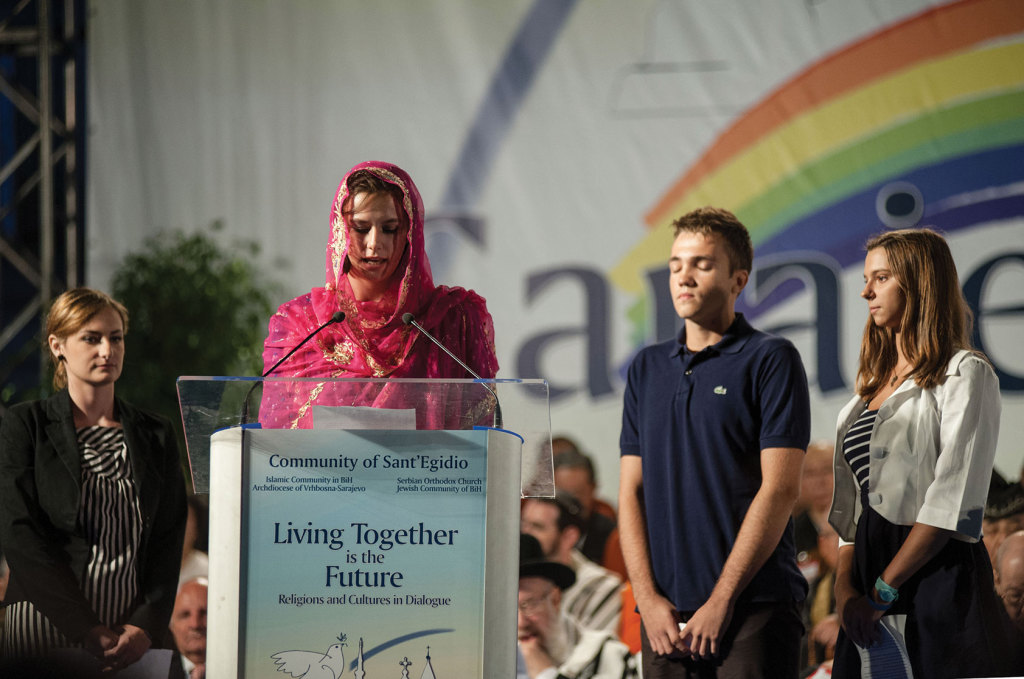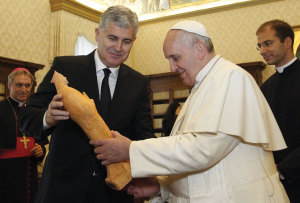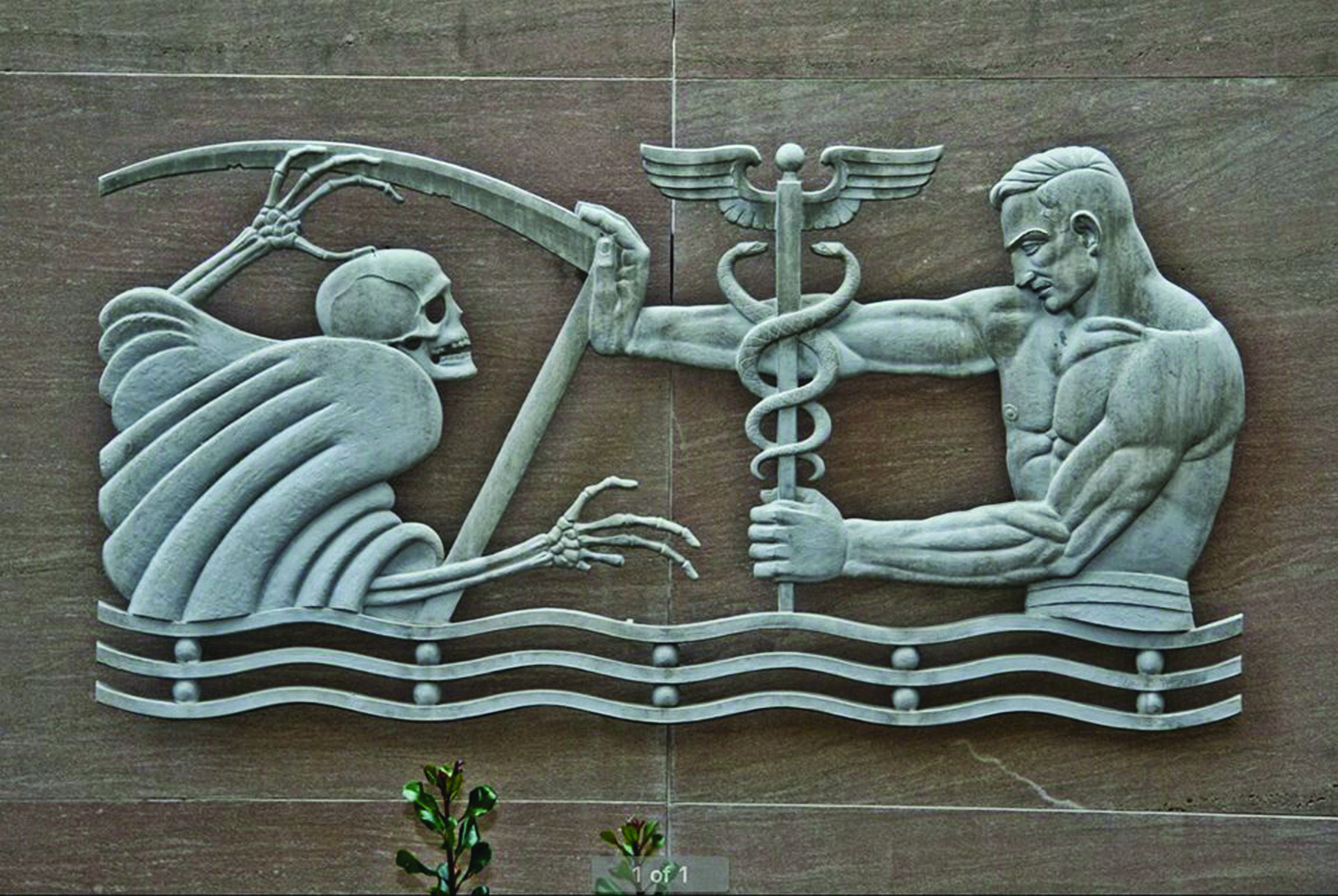
An ecumenical meeting in Sarajevo promoted by the Community of Sant’Egidio in 2012. Below, Pope John Paul II with religious leaders in Banja Luka at the end of his 10-hour visit to Bosnia-Herzegovina on June 22, 2003.
Taking advantage of the ad limina visit of the Bosnian bishops back in February 2006, we asked their president, Cardinal Vinko Puljic, to evaluate for us the situation of Catholics in Bosnia-Herzegovina 10 years after the Dayton Accords. Those peace agreements, stipulated on an American military base and ratified in Paris, put an end to a fierce civil war, but also legitimized an unjust division of that country. It was already divided in two, with three ethnic groups: one part was under the control of the Serbian-Bosnian “Republika Srpska,” and the other, the Croat-Muslim Federation (within which there was an ever-growing Islamic power). Our interview bore the eloquent title, “Bosnia and Herzegovina: the Catholic population’s Via Crucis” (see Il Consulente RE, 3/2006). Now, nine years after that conversation, I have once again spoken with the archbishop of Sarajevo to hear his updated evaluation of what is happening in that country.
Regrettably, for Catholics the situation has certainly not improved. On the contrary, Sarajevo can now be considered a Muslim city in all effects.
This is one of the “strong” facts that emerges in our long interview — truly a “cry of pain” — with the 65-year-old Cardinal, who has been archbishop of Sarajevo for the past 15 years, and cardinal for the last 11 of those, thanks to the strong-willed decision of John Paul II.
The grave responsibility for Sarajevo’s situation falls on the international community, primarily the United States and the European Union, who are careful above all not to irritate Muslims. Because of this attitude, the Muslims are soothed and pampered, which is exactly the opposite of how Catholics are treated. Catholics, in fact, have been willfully ignored in their just claim to be considered equal citizens. This is a sad example of political nearsightedness and betrayal of culture, and it persists: it certainly does no credit to Washington or to Brussels.
Your Eminence, in our 2006 interview, you seemed very pessimistic concerning the evolution of conditions for Catholics in Bosnia-Herzegovina. You spoke about a progressive Islamization, above all in the Croatian-Muslim Federation. Now, nine years later, has the day-to-day situation for Catholics effectively gotten worse? Has Bosnia-Herzegovina, the Croatian-Muslim Federation, become increasingly Muslim?
Cardinal Vinko Puljic: Unfortunately, the situation for Catholics has not improved, because, politically, Catholics are encountering more and more discrimination. In the “Republika Srpska,” the Serbian Republic of Bosnia, the injustice that was legalized in the Dayton Accords continues, with the international community’s approval. The region’s native Catholics, ethnic Croats who had to flee, cannot return there, nor can they demand that their rights be respected. And in the Federation, where Catholics and Muslims live together, rights are not equal: there are those who are more equal than others! Even the representatives of the international community sit back and accept the situation, and thus they contribute to the problem. Though we have proved, beyond a doubt, that injustices exist, we have yet to find that authorities have any desire whatsoever to come to the aid of Catholics. Here is an emblematic example: this month, at the European level, discussions are being held on human rights in Bosnia-Herzegovina. Do you think that might include Catholic, ethnic Croats? No, not at all: they are only mentioning threats to the rights of Gypsies.
In the West, there is a very widespread idea of Sarajevo’s being a multiethnic, multicultural city: this is tied to its image during the 1984 Olympics… Is this no longer the case? Today, where has Sarajevo, “crossroads of nations,” gone?
We simply cannot understand how it is that the West is incapable of seeing the current situation in the city of Sarajevo. This city is the capital of all citizens of Bosnia-Herzegovina, but it is obvious that today it belongs solely to the Bosnian Muslims. All others live here, but do not enjoy equal rights.
Here is a glaring example of discrimination: the Islamic community can build mosques wherever and whenever they please, but we Catholics have been waiting in vain for over 12 years for permission to build one church in the city, for the Grbavica neighborhood parish. Every time we ask about it, the bureaucratic machine finds ways of tripping us up. Why is this? They don’t want a church to be built, because Sarajevo has become solely a Muslim city.
How is it that Bosnia-Herzegovina has become increasingly Islamized? How much influence have the Arab nations had? How has the United States reacted?
The Arab states have generously invested huge sums of money to renovate Islamic centers and build mosques. Now they have started investing in large-scale malls that they have bought.
On the other hand, the United States reacts only if they perceive a threat of terrorism. And, since they are scared of terror attacks, they are very favorable towards the Muslims, also because the US seeks pardon for its military interventions in various Islamic countries. By being benevolent towards the Bosnian Muslims, they want to show the world that they are not against Islam.
The European Community doesn’t lack member states with a Catholic tradition. Why hasn’t it stepped in also to protect Catholics?
It is not clear to me why many countries are so quick to come to the aid of others, and yet are embarrassed when it comes to sustaining the Catholics in Bosnia-Herzegovina. This is clearly documented, whether we are talking about the European Union as an entity, or the single states that comprise it. In the current situation, we quite rightly wish to pay homage to those humanitarian organizations that have helped us survive, and to which we are very grateful. There are many Western Church organizations who have materially supported us in our battle for survival and renewal.
The current High Representative is Valentin Inzko, an Austrian of Slovenian origin. What has he done? Has he stepped in to sustain the rights of the Catholic community?
The High Representative in Bosnia-Herzegovina is a person who carries out the orders of the powers of the international community. He can do extremely little on his own. And he doesn’t do even that, given that he has no intention of ruining his career ambitions. Sadly, that is what politicians are like: they act out of personal interest.
Your Eminence, you already mentioned the bureaucratic “wall” that has found a thousand different ways of blocking the construction of a new church in Sarajevo. In the meantime, mosques are popping up all out of proportion…
As I already mentioned, the Islamic community has great opportunities for building mosques, because the powers in charge are glad to give building permits to Muslims. You need to realize that the Muslims are not only sustained materially by local politicians, they are also favored by the wider world’s powers. The international community prefers supporting the building of mosques over churches. Generally speaking, the international community’s representatives justify their attitude by saying that they cannot finance religious entities, only cultural ones, and churches are religious entities.
Has the Muslim mentality in Bosnia-Herzegovina changed in the post-war years? How much weight does radical Islam have today?

Dragan Covic, Croat member of the presidency of Bosnia-Herzegovina, presents a statue as a gift to Pope Francis in the Apostolic Palace at the Vatican December 15.
The radical mindset, I feel, isn’t so widespread in terms of dress. It is much more present, however, in people’s intolerance of any signs of Christianity. There is evident and blatant instigation of young people to ravage cemeteries and any other places that symbolize Christianity. It is understandable that this causes a reaction on the part of Christians, and naturally this does nothing to foster peace. And so one notices a behavioral schizophrenia: Muslims are very sensitive to religious offenses — for example, those against the Koran — but at the same time they themselves are greatly offensive towards the Cross and our other Christian symbols.
What kinds of contacts do you have with Muslim religious authorities? How can you define your relations with them, at the leadership level? And at the popular level?
We religious leaders communicate among each other regularly. In the interreligious council, meetings and sessions are held on a regular basis. But it is not easy to transfer a spirit of tolerance and mutual respect to the populace at large, nor to the mass media. And politicians cause tensions to increase, to garner votes. For them, politics and religion go hand in hand.
The same question, but concerning your relationship with Orthodox Christians…
With them, too, we have regular contact and meetings. We organize various events with them on the ecumenical level, such as the octave of prayers for Christian unity. But the intensity of cooperation depends on local bishops: some are more open to it, while others just don’t believe in ecumenism.
On the people’s part, there are always exchanges of good will for the various Christian feast days.
Unfortunately, the two communities do not enjoy equal status: in the “Republika Srpska” the Orthodox faith is practically the state religion.
In 2006, you told us about the monastery of the Sisters of Saint Vincent in Sarajevo, that had been turned into a hospital, but which still wasn’t operating due to the lack of adequate equipment. Is it running today?
No, it isn’t; sadly, the city authorities have blocked entrance to the building, and not even the nuns have access to their monastery. At the moment we don’t have the power to act.
We have made a plea through the court of appeals for recognition of our rights. We are afraid, however, that this is going to be a long battle, and we have no faith at all in the court’s impartiality.
Your Eminence, tell us about Catholic schools in your diocese. Are there any left? If so, how many? Who attends them?
We thank God that Catholic schools are functioning very well in our Vrhbosna-Sarajevo diocese.
Within the territory of the diocese, there are five educational complexes, each with their various schools (elementary, middle, high school, and nursing school) that we call “Schools for Europe.” These schools are attended by a total of about 5,000 students. In Sarajevo, the only multiethnic school is, in fact, our Catholic scholastic complex.
How many seminarians does your archdiocese currently have? In 2006 there were about 40 in the upper seminary and about 40 in the lower one…
Even now there are two seminaries. In the upper one we have more than 40 seminarians, and the situation is the same in the lower one. Our theology department has been made a faculty, incorporated into the University of Sarajevo, but we still don’t have the same rights as all the other faculties. We are still working on this.
On November 17, 2010, the Federal Tribunal of Sarajevo served you with a notice of eviction from your apartment in the diocese’s bishop’s residence. They wanted to give it to the heirs of the communist spies that expropriated and occupied it during the regime. Are you still living there? What reactions came about from the sentence? What does the diocese intend to do?
When I received news of the court sentence, stating that a communist spy had the right to take up residency here, my reaction was very strong: over my dead body!
That same day I invited every last diplomat over, and I made clear to them what would happen if the sentence were applied, and they understood that this was a very, very delicate business.
The state authorities solved the matter by giving the heirs an apartment in the city, thus freeing our home from any further problems. The faithful weren’t worried, because they saw my forceful reaction. And I had the support of numerous citizens and mass media outlets.
Your Eminence, one last question, concerning Medjugorje. In the past, you always gave it a positive evaluation, citing its positive pastoral fruits (confession, prayer, life-changing experiences…) but you always added that a judgment on the actual apparitions was another matter. You are also a member of the Vatican’s investigating commission on Medjugorje that started meeting a year ago. Have your evaluations on Medjugorje changed at all, with respect to the past?
Since I am now a member of the Commission for Medjugorje, I can’t release any declaration on this topic. The Commission is studying the matter, and when it has examined and evaluated everything, it will present its findings to the Holy Father. Until then I cannot release any declaration.







Facebook Comments